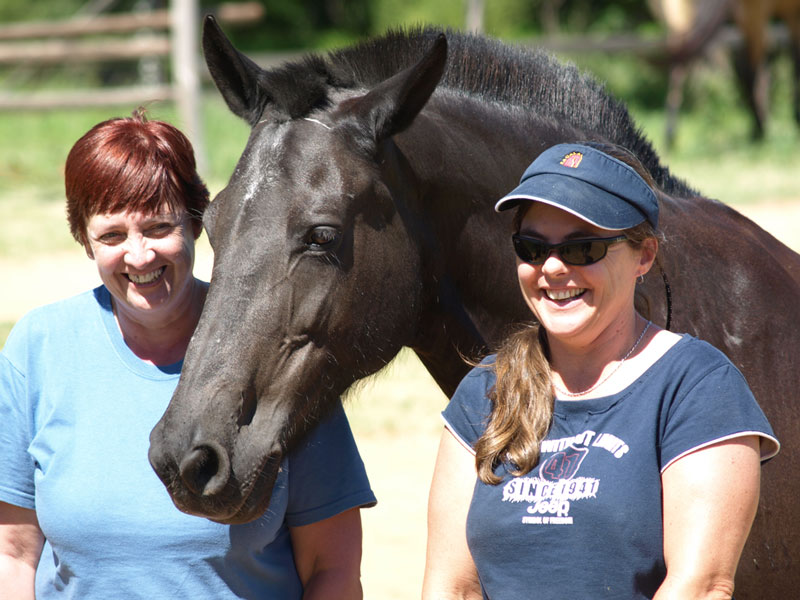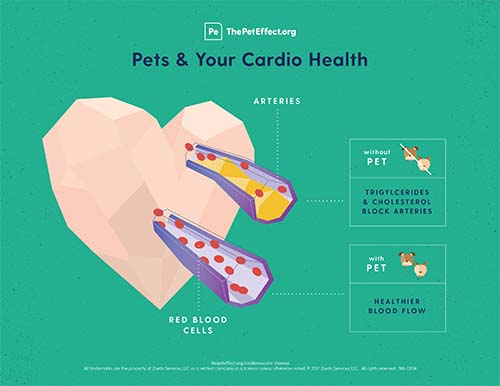Mental health and well-being are as important in older age as at any other time in life. Approximately one in four older adults lives with one or more mental disorders, including anxiety and depression, and many struggle with social isolation and loneliness.[1] Another health risk associated with aging is dementia, including Alzheimer’s disease. These health issues can severely impact quality of life and can pose risks to physical health as well.
While disabilities due to mental disorders are a major public health concern, there are many effective programs for older adults that address such issues. Research increasingly supports the health benefits of human-animal interaction (HAI) and pet ownership on the mental health and well-being of older adults. In addition, the presence of a companion animal can also benefit caregivers through reducing their physiological stress.[2]

Therapy dogs can be trained to assist those with Alzheimer’s Disease in day-to-day tasks. Here, a dog from Dementia Dog fetches a woman’s medication. Photo: Dementia Dog
Social Isolation and Loneliness
Research shows that social relationships – both quantity and quality – profoundly affect mental and physical health. Social isolation and loneliness are a growing public health epidemic that uniquely impacts older adults. According to the 2016 Census, one in five adults age 65-74 live alone, while 4 in 10 of those age 85 and older live alone.[3]
Human-animal interaction has shown to reduce feelings of loneliness in older adults. A nationally representative survey of pet owners and non-pet owners commissioned by HABRI and Mars Petcare found that:
- 85% of respondents agree interaction with pets can help reduce loneliness
- 76% agree human-pet interactions can help address social isolation
- 72% believe human-animal interaction is good for their community
Of the pet-owning respondents:
- 80% of pet owners say their pet makes them feel less lonely
- 54% say their pet helps them connect with other people
For more information about the HABRI-Maws Petcare survey, please click here.
Many peer-reviewed, scientific studies have demonstrated the efficacy of pet ownership and human-animal interactions for reducing loneliness and social isolation in older adults.[4]
Loneliness
- Animal-assisted therapy (AAT) was shown to significantly reduce loneliness among residents of long-term care facilities in a study of three such facilities.
- The study found that a large subpopulation of residents has a strong life-history of a relationship with pets and would choose, if possible, to continue that relationship.[5]
Social Support
- Results of a study of older adults who live alone suggest that pet ownership may act as a buffer against loneliness.[6]
- Results of the study suggest that pet ownership may instill a sense of self worth and responsibility in older adults that they would not otherwise have. Additionally, the care involved in owning a pet – including visits to the veterinarian and walking – may lead to increased socialization.
- A study of pet ownership among LGBT adults over 50 concludes that pet ownership among this demographic has a variety of health benefits, suggesting that the unique hardships this community has faced makes them especially receptive to the health benefits of HAI.[7]
- The study found that many participants compared their pets to children in a way that may substitute a source of love that was difficult to acquire given structural constrains encountered throughout life.
- The findings also reveal pets were associated with higher levels of perceived social support while also compensating for the negative effects of a smaller social network size, particularly for older LGBT adults living with a disability.
- Results of a study that analyzed data from the Health and Retirement Study (HRS) suggest that pets can offer social support in the event of major loss.[8]
- The study found that pet ownership significantly minimized the depressive effects of a social loss when compared to non-pet owners in middle-aged and older adults.
- The study also found pet owners facing a loss did not experience greater increases in loneliness compared those who did not experience a loss.
Depression
-
- A study of older adults with mental illness living in long-term care facilities concluded that AAT reduced depressive symptoms and improved cognitive function.[9]

Animal-assisted interventions, including equine-assisted psychotherapy, have been demonstrated to improve outcomes for those with depression. Photo: EAGALA
Alzheimer’s and Dementia
The terms ‘dementia’ and ‘Alzheimer’s’ are often used interchangeably, but these two words mean different things. Dementia is an umbrella term which describes a wide range of symptoms severe enough to interfere with daily life, including a decline in memory and changes in thinking and reasoning skills. Dementia is not considered a normal part of aging. Alzheimer’s Disease is a specific, degenerative brain disease that is caused by complex brain changes following cell damage. Symptoms get more severe as Alzheimer’s advances, and includes confusion, behavior changes, and impaired mobility.
Many forms of dementia exist. Alzheimer’s accounts for 60 to 80 percent of dementia cases.
Research has indicated that the human-animal bond can play an important role in improving the quality of life for people living with Alzheimer’s or dementia as well as their immediate network of caregivers.
Reduction of aggression and agitation
- In a pilot study, 15 nursing home residents with dementia participated in a daily AAT intervention for three weeks. Results showed statistically significant decreases in agitated behaviors and a statistically significant increase in social interaction pretest to post-test.[10]
Improvements in Nutrition
- One study of elderly patients with Alzheimer’s Disease found that after the introduction of an aquarium into the facility, patients experienced higher food intake and weight gain, and a reduced requirement of nutritional supplementation.[11]
Promotion of Social Behavior
- Animal-assisted activities (AAA) have shown to improve awareness and communication skills of elderly patients with dementia during the activity[12]
- A systematic review examining the relationship between Animal-Assisted Interventions (AAI) and behavioral and psychological symptoms of dementia found that 11 out of 12 studies demonstrated increased social interaction with AAI.[13]
Increasing Quality of Life
- In a randomized-controlled trial, dog-assisted therapy was shown to improve mood, psychosocial functioning and quality of life in elderly dementia patients living in residential aged care facilities[14]
- Animal-assisted therapy has been shown to lower levels of distress in dementia patients in residential care facilities, with significant reduction found in caregivers’ distress levels[15]
Reduction of Depression
- A six-week AAT intervention with dogs demonstrated that AAT was efficient in improving depressive symptoms and cognitive function in residents of long-term care facilities with mental illness. Self-perceived quality of life was also greatly improved[16]
For more information about Alzheimer’s:
For more information about Dementia:









